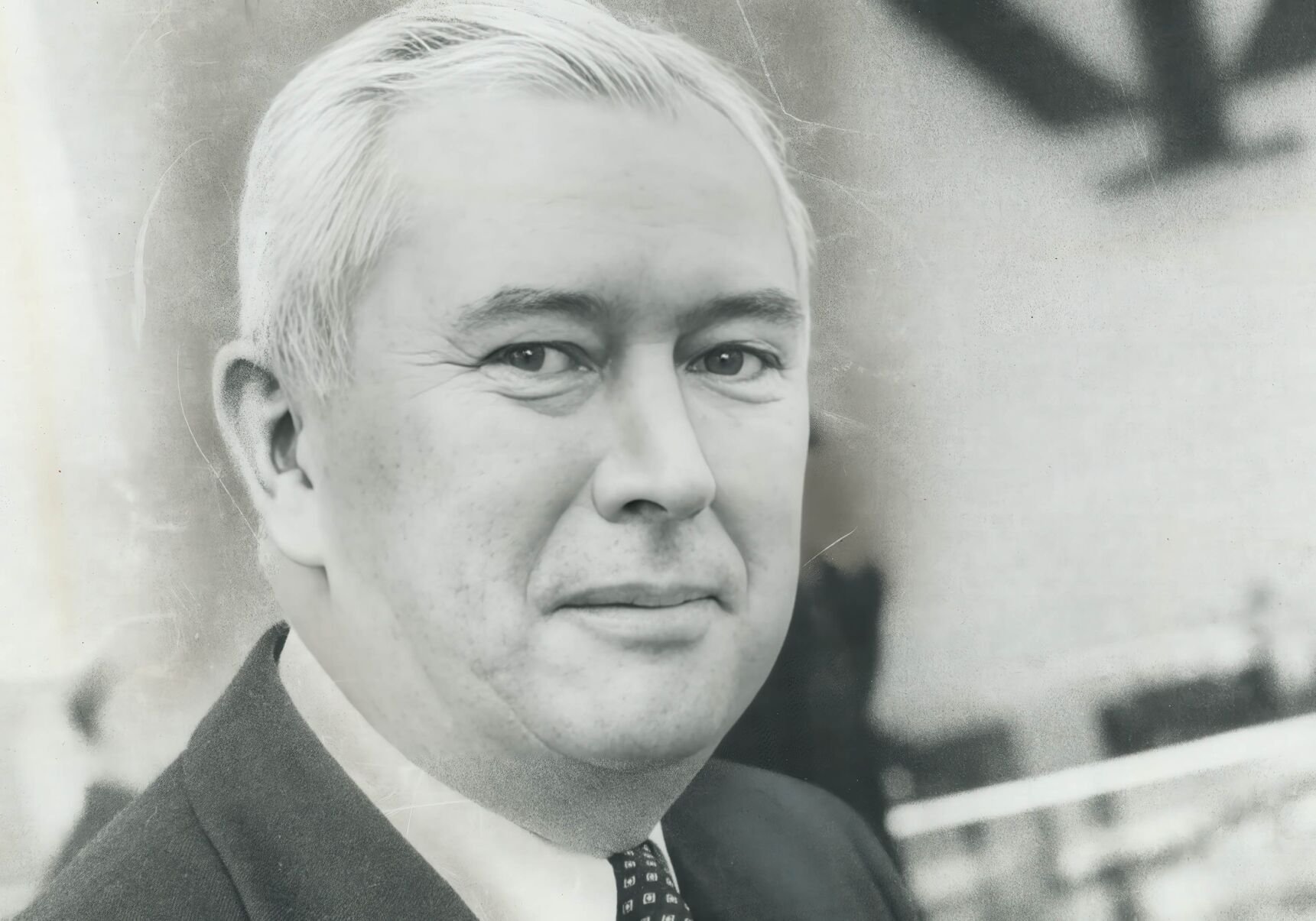As a member of the elite 1st Canadian Parachute Battalion, with its distinctive maroon beret, Russell Harrison was among the first Allied troops who landed in Normandy on D-Day, June 6, 1944. As he flew across the English Channel aboard a Dakota in the dark of night, he must have wondered if his intensive training had sufficiently prepared him for all that lay ahead.
After graduating with a Commerce degree in 1943, Harrison concluded that with the Second World War already raging, conscription would soon be invoked. Rather than await the inevitable, he enlisted and learned lessons during the war that would colour his career in banking.
A solid five-foot-ten, with swept-back hair, canny brown eyes, and draped in his pinstriped suits, Harrison was CEO of CIBC from 1976-1984. He was well aware that the very architecture of branches, with their imposing columns, steep steps, polished floors, and tellersÔÇÖ cages could make customers feel both awestruck and uncomfortable at the same time. ÔÇťWhen you come into a bank,ÔÇŁ he once said, ÔÇťyou come into a confessional in the financial sense.ÔÇŁ
An interview I did with him in 1979 was the one and only time he agreed to sit still for me. So, when I sought later to write about him at greater length, I talked to CIBC executives, fellow paratroopers, and his family, among many others.
I learned that his Battalion trained at Carter Barracks near Stonehenge on Salisbury Plain in the south of England. They built their endurance through 50-mile marches completed in less than 20 hours while carrying full battle gear. And, of course, there was the jumping: first from towers, then moored balloons, and finally from aircraft.
Harrison qualified as a parachutist just before Christmas in 1943, at RAF Station, Ringway, near Manchester. ÔÇťIt is really quite a sensation & anyone who says you arenÔÇÖt scared when youÔÇÖre up there is crazy,ÔÇŁ Harrison wrote to his sister in Winnipeg in a letter she made available to me. ÔÇťYou donÔÇÖt get used to it either ÔÇö each time you are just as scared as you were the time before.ÔÇŁ
Shortly after midnight on D-Day, Harrison along with more than 500 officers and men from the Battalion, all of them loaded down with weapons, extra clothing, medical supplies, and other equipment, parachuted silently toward their drop zone on the eastern flank of the Allied invasion area that covered 60 miles of the French coastline.
At first, Harrison had become entangled in a tree, but freed himself. The men under his command were scattered over a larger area than originally planned, so Harrison spent an anxious few minutes until they were safely assembled.
By noon, less than twelve hours after landing, the Battalion had fulfilled its assignment to secure a strategic crossroad and the surrounding area. The human cost was high. A fifth of the members of the Battalion were dead. Harrison was wounded in the cheekbone while on patrol.
In March 1945, Harrison, by then promoted to Captain, parachuted into Germany as part of the final Allied assault. As they drew closer to their goal, the city of Wismar on the Baltic Sea, the trek grew easier. The war was clearly coming to an end. The Battalion passed German troops who neither showed a white flag nor fought. The 1st Canadian Parachute Battalion arrived in Wismar on May 2. The Germans surrendered.
In later years, Harrison would regale his bank colleagues with tales of his wartime exploits.
ÔÇťHe was quite open to tell you he had killed 11 Germans during the war,ÔÇŁ said Warren Moysey, manager of the main branch in Montreal when Harrison was Regional General Manager of Qu├ębec during the 1960s.
That single combat warrior mentality would forever mark HarrisonÔÇÖs management style.
ÔÇťIÔÇÖll bet his men hated him with a vengeance at times, but loved him,ÔÇŁ said David Lewis, a senior vice-president under Harrison in the 1970s and early 1980s. Harrison died in 2014.
For all HarrisonÔÇÖs power as CEO, there were occasions when he could be remarkably modest, according to an incident related to me by John A. Willes, professor of labour relations and business history at QueenÔÇÖs University. Willes had requested an interview with Harrison to gather material for the BattalionÔÇÖs official history.
In response, Harrison invited Willes and his wife, Frances, to lunch with him in the bankÔÇÖs executive dining room in ╔ź╔ź└▓. When the couple arrived in the lobby of the building, Harrison was waiting to greet them at the elevator.
As he stood unrecognized amid bank employees and other passersby, Harrison said to the couple, ÔÇťNobody pays any attention to me. They donÔÇÖt know who I am.ÔÇŁ
At war, and in life, the only people Russ Harrison could count on for certain were his buddies in the Battalion, but most of all, himself.































To join the conversation set a first and last name in your user profile.
Sign in or register for free to join the Conversation